Rural Dharma Friends Transcend Boundaries
To Create a Sangha Large Enough to Thrive
Written by: Janaki (Kathryn) Howard and Chris Howard
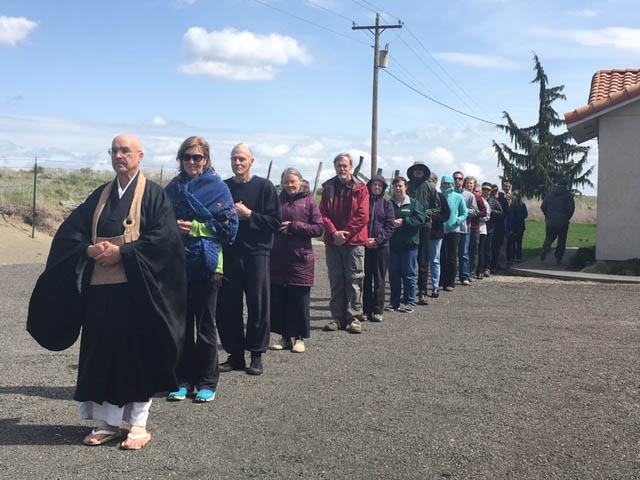
Genjo Marinello Osho, visiting from Seattle, leading kinhin (walking meditation) at a recent retreat with Wallw Walla Dharma Sangha members and other retreatants.
Photos by: Terra Howard, Tim Kaufman-Osborn, Jeanne McMenemy
Turning scarcity into strength, the few dharma practitioners in a remote Eastern Washington town have created a sangha that embraces their different traditions.
“What else would work?” said Walla Walla Dharma Sangha member Jane Long. “We are such a small community, I don’t see how one teacher or one lineage would work for all of us.”
Walla Walla Dharma Sangha includes all forms of Buddhism. Some of our members practice Vipassana, some Zen, while others focus on Tibetan Buddhism.
Surrounded by thousands of acres of wheat fields near the Oregon border, the town of Walla Walla and its 33,000 people are best known for growing wheat, wine grapes, and very large onions called Walla Walla Sweets. One of the state’s largest penitentiaries is there. It hardly seems a place where the dharma would thrive.
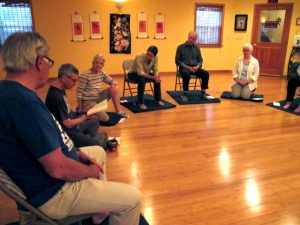
Bart Preces, Mikel Swayze, Trudi Shannon, Karen Kirkwood, Wayne Chabre and Jane Long listen to a reading, before the Sunday evening sitting meditation.
But for the past 11 years we have gathered together on Sunday evenings as one sangha. As we sit side-by-side in silent meditation we support each other internally, no matter what path an adjacent sangha member is pursuing.
When we created the Walla Walla Dharma Sangha, we decided that adhering to a particular form, sect or lineage of Buddhism would split the region’s small number of dharma seekers into unsustainably small groups. By becoming an eclectic group we welcome everyone, and find there is strength and support in numbers.
For instance by collaborating we can together afford to use the Many Waters Wellness Center for our meetings, and bring in teachers throughout the year. Some sangha members study with teachers located in other cities, and visit those intermittently.
“Our sangha is a close-knit group.” Said member Mikel Swayze. “People can have their own teacher as they wish.”
Illustrating the variety, Genjo Marinello Osho, leader of Chobo-ji Zen Center in Seattle, led a day-long Zen meditation retreat in April. He also visited the Walla Walla Penitentiary Minimum Security Buddhist group, and gave a public talk at Whitman College.
Dori Langevin, a Spokane practitioner and teacher of insight meditation, will lead a June retreat sponsored by Mid-Columbia Insight Meditation.
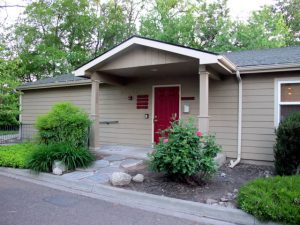
The sangha meets in the Many Waters Wellness Center (the native name for Walla Walla valley).
Over these 11 years our friends at Insight Meditation of the Mid-Columbia in Richland have co-sponsored with us 56 retreats led by 16 different teachers. These teachers have included Santikaro Upasaka from Liberation Park, Wisconsin; Tim Geil from Seattle Insight Meditation Society; Venerable Thubten Tarpa from Sravasti Abbey in Newport, Washington; Lama Inge from Spokane, and Myatt Htoon, from Vancouver, B.C.
When these teachers visit us and lead retreats they usually broaden their approaches beyond their lineage, to appeal to the wide variety of practitioners we have here.
Walla Walla Dharma Sangha had a bit of a nomadic beginning, moving three times before we settled into the perfect home seven years ago at the Many Waters Wellness Center. This center borders a park at the end of a quiet street.
While our membership has changed over the years, the sangha has been sustained by a core group of dharma practitioners. One of their commitments has been to maintain a dharma presence on every Sunday evening, throughout the year.
Members of the sangha take turns leading the weekly Sunday evening meditation. The leader of the evening reads a passage from any book they have found inspiring, then rings the bell for 30 minutes of sitting meditation, 10 minutes of walking meditation, and 20 minutes more of sitting meditation.
This consistent Sunday practice period has proven to be valuable, because sometimes a visitor will find us on the internet, and will show up looking for an inviting meditation hall where they can sit amongst fellow practitioners.
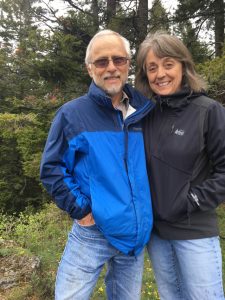
Chris and Janaki Howard.
On the second Sunday of each month we change the schedule, so that after the sitting and walking meditations we as a group discuss a reading or text that week’s leader has chosen.
On the fourth Sunday we utilize the time for a “check in” opportunity, where each of us can talk about our individual practice. Participants are welcome to share or to not share, to whatever extent they feel comfortable. There is no cross talk or advice given to those sharing.
Since we do not have a set dharma teacher, this is one way we can support each other in our practices, and contribute to a sense of group cohesiveness. There is much wisdom shared in these open-hearted times.
“What I really like about our sangha is that I can come to the Sunday evening sit and have Zen thoughts, but no one cares,” said member Jeanne McMenemy. “It’s really all the same.”
Recently we started a “sangha friend” offering to newcomers, who may want to know more about our group, about meditation practice and about Buddhism in general. More experienced practitioners meet one-to-one with the new person at some time during the week to provide support, answer questions and share about Buddhism.
In the fall we plan to offer a “Buddhism Basics” course focusing on the four noble truths, the teachings about generosity, and the noble eight-fold path, as well as basic meditation practice.
Our sangha’s primary service project is weekly visiting the Walla Walla penitentiary, to hold space for inmates to practice, and to discuss Buddhism and the challenges of living in the penal system. Twice each month sangha volunteers visit all five units in the penitentiary, as they have for more than seven years.
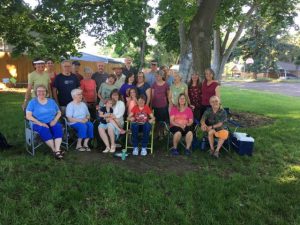
In 2017 sangha members gathered for the 10th anniversary celebration and picnic at Menlo Park in Walla Walla.
“Knowing that I have a safe, quiet place to share my Buddhist practice makes my time here much less stressful,” said one inmate. “Here I can discuss my struggles and find ways of coping with the prison environment.”
In addition to the regular prison meetings, each unit has an annual “Buddha Day.” Usually a monk or a teacher visits, leads meditation, gives a talk, and facilitates discussion about practicing mindfulness while “inside.” A special healthy meal is served to the gathering.
In addition we publish the InsideOut Newsletter, which is free to all prison inmates in Washington state. Buddhist inmates write the articles and provide artwork, to share with other Buddhist inmates. This publication started in 2008 and continues quarterly.
We also organize social events — potlucks, sangha anniversary celebrations, sangha benefit yard sales, and coffee klatches – which also contribute to developing our connections with each other. This fall we’re planning a mindfulness hike and picnic in the Blue Mountains, with Zen teacher Genjo Marinello Osho.
